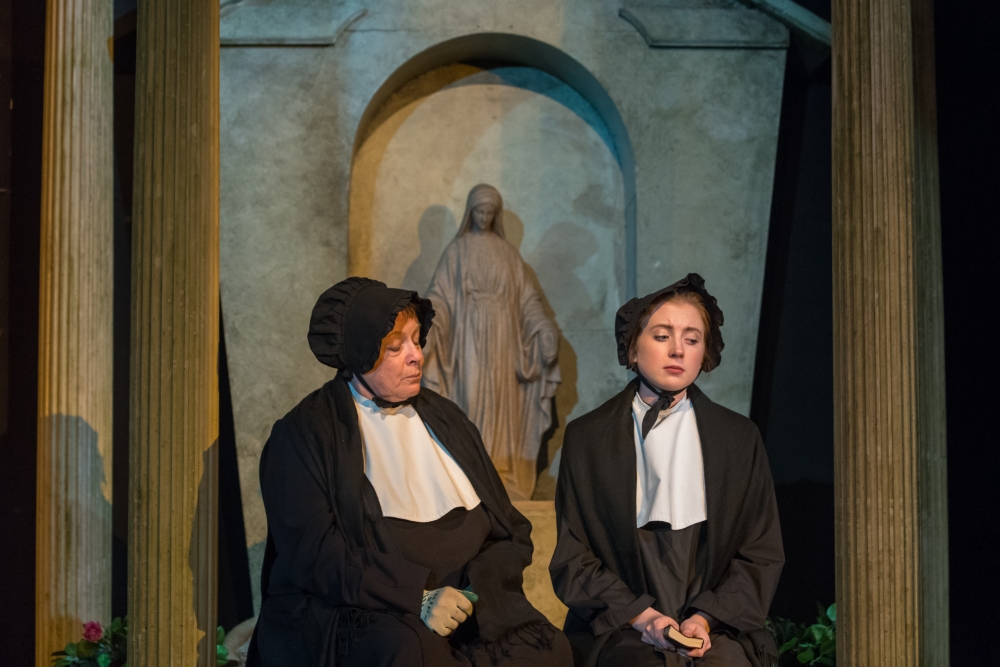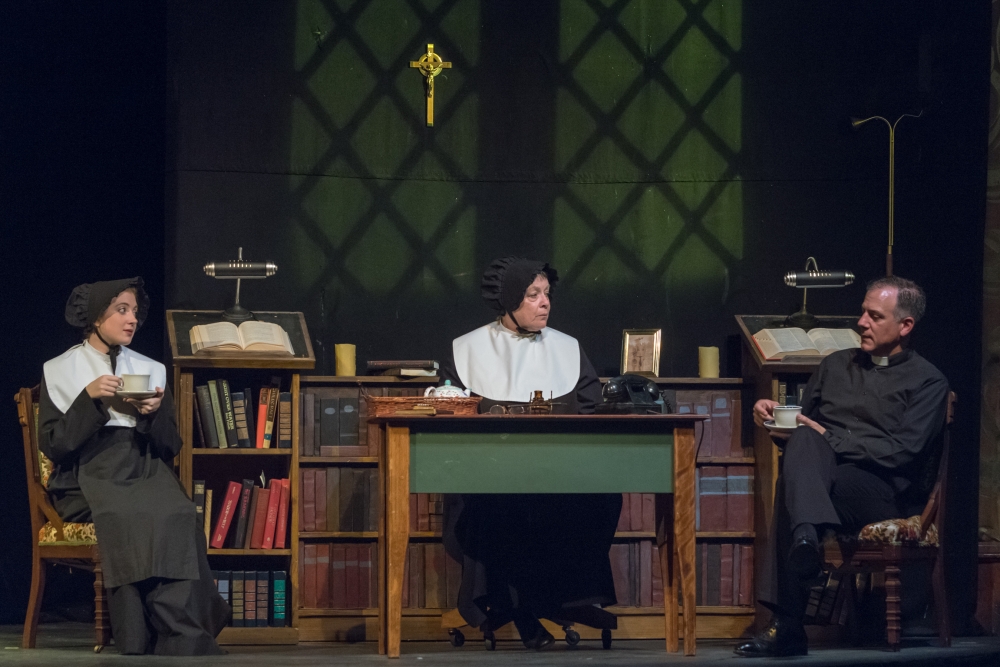
Sister Aloysius (Kathy Jones) and Sister James (Kendall Davis) discuss what to do. (Photo by Steve Atkinson – courtesy of Church Hill Theatre)
Community theaters thrive on cozy mysteries and popular musicals; but at their best, they can take on far more challenging projects. For clear proof, theater lovers need to look no further than the production of John Patrick Shanley’s Doubt — A Parable, now playing at Church Hill Theatre.
Written in 2004, Doubt won a Pulitzer Prize and a Tony Award in 2005 and was an Academy Award-nominated film starring Meryl Streep and Phillip Seymour Hoffman in 2008. The play’s original production ran 525 performances. It has seen numerous revivals, including a number of international performances in France, Germany, the Philippines and Australia.
Directed by Michael Whitehill, the play deploys a solid cast in a tense examination of the kind of issue that can destroy a community. Set in a Catholic school in the Bronx in 1964, it begins with Father Flynn, one of the parish priests, delivering a sermon on the subject of doubt. Warm and colloquial, the sermon quickly establishes the priest as likable and humane – a good example of the kind of change that was coming to the church (and society at large) in the 1960s.

Father Flynn (John Haas) preaches a sermon on “doubt”. (Photo by Steve Atkinson – courtesy of Church Hill Theatre)
But the second scene throws a cloud over that impression. Two nuns – young, idealistic Sister James and older, traditional Sister Aloysius, the principal of the school – meet to discuss Sister James’s classes. Sister Aloysius quickly makes it clear that she holds a dim view of the changes in the church, and of Sister James’s more modern ideas – including her enthusiasm for teaching history and her naive view of her eighth-grade students. The discussion focuses on one student in particular – Donald Muller, the school’s first black student. As the plot develops, young Donald – who never appears on stage – becomes the focus of everyone’s attention.
The conflict turns critical when Sister James tells her principal that Donald has come back from a meeting with Father Flynn with the smell of alcohol on his breath. What is going on? There is no solid evidence but Sister Aloysius is certain that something is going on, something that might bring scandal to the parish and to her school. The overall themes of the play comes in the attempts of the two nuns to get to the heart of the issue.

Mrs. Muller (Barbi Bedell) is called into the principal’s office to discuss her son Donald. (Photo by Steve Atkinson – courtesy of Church Hill Theatre)
The play builds up to its crisis through several meetings among the characters, in twos or threes, with an appearance by Donald’s mother introducing new – and even more confusing – evidence into the building case. The characters move back and forth between doubt and certainty about all the questions arising from a seemingly minor incident. The theme of doubt builds relentlessly – and in the end, the audience is likely to be torn between those who want to see the best in the characters and those who fear the worst. But the core of the play concerns the process of moving between certainty and doubt, of living in ambiguity, of whether we ever can be really certain — and of how being certain can limit what we see. Power struggles go one both between the characters and within each character’s conscience.
Whitehill has assembled a strong cast, and they make the most of the challenging script. John Haas takes the role of Father Flynn, and his performance does a good deal to give the play its bite. For the play to achieve its point, the audience has to find Flynn likable and sincere – even a bit charismatic – and Haas does that very convincingly. A history professor at Chesapeake College, Haas has been onstage in several previous CHT productions – but this role is among his strongest to date.
Kendall Davis, a 2016 Washington College graduate – with a double degree in theater and English – plays Sister James with just the right degree of earnestness. Davis has had several recent roles in CHT productions, including in Jake’s Women and Witness for the Prosecution. Here, she brings a warm portrayal of a character caught in the transition between her calling to a very traditional institution and the new ideas filling the air in the early ’60s.
Kathy Jones is appropriately stony as Sister Aloysius, in many ways the least sympathetic character in the cast — and yet, what if she’s right? She is the classic stereotype of a Catholic school teaching nun – a ruler-wielding, by-the-rules disciplinarian, sure that she is right. But Jones lets her character’s human side show through just enough to prevent the principal from being only a stereotype. Sister Aloysius likes gardening and listening to a transistor radio – that she confiscated from a student! And she cares about her school and its students. And she will fight when she feels her school, its students, or its reputation are in danger. An outstanding performance in a very challenging role.
Barbi Bedell takes the role of Mrs. Muller – a role she played in a production of the same play at the Garfield Center in 2009. As with the other characters, the role is more complex than it may at first seem — Mrs. Muller is intent on protecting her son from a range of threats far wider than the nuns are aware of. Bedell effectively conveys her practical wisdom and her deep commitment to her son’s future. She may be the only one who understands that everyday life is complex and uncertain.
The set was attractive though unusual, with the stage divided between two mini-sets: an outdoor shrine at stage right, and Sister Aloysius’s office at stage left. This meant that the majority of the action took place on one wing of the stage or the other, with two sermons by Father Flynn the main exceptions. The lighting is used to good effect, fading in and out to indicate change of place or the passage of time. There are no blackouts or scene changes to disrupt the flow of the story.

Tea with Sister Aloysius who rules the school from her office. (Photo by Steve Atkinson – courtesy of Church Hill Theatre)
The play runs about 90 minutes with no intermissions. Each performance will be followed by a talk-back session with the audience, director, and actors – an interesting look both at the audience’s reactions to the performance and at the very serious thought the cast put into realizing the play’s themes. About half the audience stayed for the discussion – which got into considerable detail about the script and the strategies the director and cast used to make it work on stage. Whitehill said on Wednesday that the audience members who stayed for the talkback were eager to share their perspective, with one night’s audience staying two hours after the final curtain to discuss the issues raised by the script and the performance. Be sure to stay for the talkback — it adds a real dimension to the play’s themes.
In case I haven’t made it clear, this production of Doubt is a must-see for anyone who enjoys serious, thought-provoking drama. Kudos to Whitehill and the outstanding cast, and to Church Hill Theatre for this high-caliber production.
Doubt will be playing through Sept. 24, with performances at 8 p.m. Fridays and Saturdays and matinees at 2 p.m. Sundays. Admission is $20 for adults, with a $5 discount for CHT members; student tickets are $10.
For reservations, visit the theater website or call 410-556-6003.



Write a Letter to the Editor on this Article
We encourage readers to offer their point of view on this article by submitting the following form. Editing is sometimes necessary and is done at the discretion of the editorial staff.